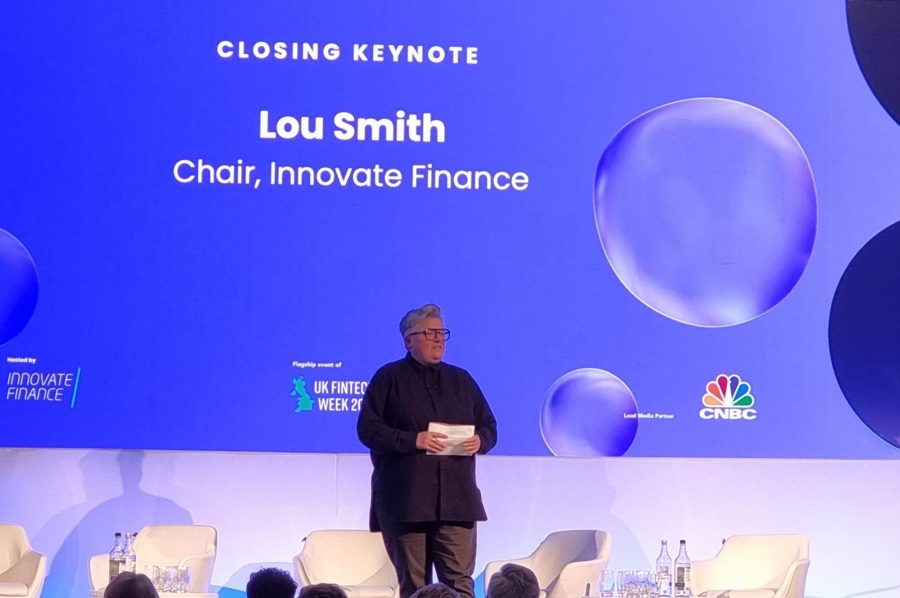
[ad_1]
From ‘CBDC FOMO’ to crypto regulatory ‘turf battles’, there was tons to mull over throughout one other jam-packed agenda on day two of Innovate Finance World Summit (IFGS) 2023.
The ninth successive 12 months of IFGS has attracted greater than 50 nations and over 1,500 individuals to the Metropolis of London’s historic Guildhall. Greater than 60 UK exhibitors additionally demonstrated the most recent applied sciences for the way forward for finance.
Tuesday served up one other eclectic lineup of panels and hearth chats with a deal with crypto, digital property, CBDCs in addition to funds innovation, insurance coverage trade disruption, and trade development challenges.
Concentrate on digital identities
Day two within the Outdated Library kicked off with a keynote speech from Paul Scully MP, Minister for Tech and the Digital Financial system, who put the highlight on successes in fintech and tech for London in addition to the remainder of the UK. He additionally outlined the significance of enabling “the widespread use of trusted digital identities throughout the UK” saying they had been “important to maximise the expansion of fintech”.
“It’s estimated that financial savings as much as £800million a 12 months could be realised throughout the UK financial system via the widespread use of digital identification,” stated Scully. “We’ve already made improbable progress in encouraging the adoption of digital identification and with continued contributions to the sector we are able to obtain additional development on this area.”

Hearth chat with Coinbase
Following from Scully, we loved a fireplace chat between Brian Armstrong, CEO of Coinbase, and former chancellor George Osbourne. The pair delved into digital property, regulation in crypto and decentralised identities.
Armstrong recommended the UK on its progress in crypto because of “unimaginable management from individuals like Rishi Sunak” on pushing the significance of science and expertise. He additionally stated the very fact one regulator, the FCA, oversees every thing is helpful.
“I’ve to offer the UK loads of credit score for that,” he stated, whereas commenting on the crypto “turf battles” within the US between the Commodity Futures Buying and selling Fee (CFTC) and the U.S. Securities and Alternate Fee (SEC) over crypto regulatory supremacy.
“We get contradictory statements from the heads of CFTC and SEC nearly each week. How is a enterprise working on this area in a position to be clear concerning the guidelines?”
CCAF’s fintech map instrument

Whereas over within the Livery Corridor, Bryan Zhang, co-founder and government director at Cambridge Centre for Various Finance (CCAF), the College of Cambridge Decide Enterprise Faculty, demonstrated the usage of a brand new instrument created by CCAF – “A brand new, interactive digital instrument that maps the footprint of UK fintechs”, within the panel ‘Fintech Going World‘.
“We’re in a position to compile a improbable database with 558 UK fintechs, of which 152 are self-reported via the survey after which we open-sourced knowledge from one other 406 UK fintechs,” Zhang defined.
Zhang additionally outlined the goals of the instrument and the way it might help UK fintechs: “The instrument is for fintech founders and CEOs to make use of this database to design their worldwide technique. It’s additionally for them to facilitate conversations with funders and traders and to assist them broaden into these markets.”
Funds improvements driving monetary inclusion and sustainability
Rashee Pandey, head of membership and development at Innovate Finance, moderated the subsequent Livery Corridor panel which centered on the facility of fee innovation together with the likes of open banking to drive monetary inclusion and sustainability.
Dan Graf, CEO at Earthchain, stated: “One factor to notice is that 99 per cent of British companies are what you’ll name SMEs. These SMEs are accountable for 50 per cent of our carbon emissions which is horrifying. And solely three per cent of them have really reported their emissions and arrange methods to do one thing about it”.
Duncan Cockburn, founder and CEO at OneBanx, mentioned monetary inclusion: “Open banking to me is rather more than simply funds. A big a part of it’s round identification and it encourages third events to construct a relationship with the shopper.”
“With money, the one approach in which you’ll entry money for the time being is through the use of a chip and pin – that’s the one present legitimate type of identification in impact. Open banking encourages and allows numerous completely different types of authentication”.
Emilian Siemsia, CTO at Planky, defined among the obstacles remaining in the best way of open banking enhancing monetary inclusion: “In response to analysis at Planky, greater than 70 per cent of consumers nonetheless don’t utterly belief this expertise. The considerations of the shoppers are round what is going on with the information. So there are nonetheless clear points surrounding transparency, training and belief.”
BNPL regulation
Alex Marsh, head of Klarna UK, mentioned the present regulatory proposals on purchase now, pay later from the Treasury. He stated: “There must be a stage enjoying discipline on the subject of BNPL regulation regardless of the range of merchandise within the trade. The dangers with the Treasury’s present proposals is that this doesn’t lengthen to BNPL preparations which can be supplied by retailers straight.
“The present proposals by the Treasury will undermine loads of efforts of the broad regulation by persevering with to drive confusion in customers who can’t distinguish between BNPL provided straight from retailers, and people provided from a third-party supplier.
“Regulatory certainty is useful for traders seeking to spend money on fintech. After they know what the principles are, they’re extra more likely to need to push their boundaries and strike for the most effective outcomes.
“Many policymakers and regulators have by no means really used the product, and their selections are based mostly on what they’re studying within the media quite than experiencing it and its advantages. I’d actually encourage coverage makers to make use of the product, with a purpose to perceive the advantages and worth that it could possibly carry to the desk.”

Financial setting difficult fintechs
As one other panel mentioned what in the present day’s financial setting means for fintech, Caroline Vaughan, director of worldwide exterior affairs at Minna Applied sciences, defined the developments present in these situations: “We’ve seen developments round customers, in case you take a look at subscriptions, ‘hacking the system’ for lack of a greater phrase. Shoppers actually need to handle their cash and are getting the suppliers to do this. So we’ve seen a savviness and this kind of financial setting breeds innovation.”
Vanessa Roberts, head of technique and accountable enterprise at Leeds Constructing Society, defined how powerful the panorama is at present for first-time patrons available in the market:
“One among our functions is getting residence possession inside attain of extra individuals. However really, it’s actually powerful to get on the property ladder proper now. In actual fact, it has not been as powerful as now to purchase a home within the UK since Victorian instances.”
Roberts additionally mentioned how Leeds Constructing Society has needed to adapt its technique in response to powerful financial situations. “We had one explicit enterprise line in second properties the place we helped individuals to mortgage second properties. Nonetheless, we exited that enterprise line as a result of really that didn’t match with our goal and made it tougher for first-time patrons – even though it was very worthwhile for us,” she defined.
Gone Fishing: The Fintech Expertise Search
The Fintech Instances‘ personal editorial director, Mark Walker, moderated one other panel session specializing in the fintech expertise search. Claire Tunley, CEO of the Monetary Companies Abilities Fee, mentioned the depth of the issue: “There are at present 48,000 vacancies in monetary providers as a sector. That’s one of many largest gaps of any sector within the UK. We have to have underpinning abilities equivalent to artistic pondering, relationship administration and teamwork as a result of these are the talents that get the experience via to services.”
“Should you can retain your individuals and construct them, then you may actually remedy a few of your recruitment issues,” defined Tunley, “Individuals need to know that they’re being handled pretty. They don’t need to be stereotyped or pigeonholed. Subsequently, these inclusions actually matter as a result of if individuals don’t prefer it then they are going to go. It’s such a sizzling expertise market for the time being that we are able to’t afford to not take into consideration inclusion”.
Anna Brailsford, CEO and co-founder of Code First Women, defined the problems that trigger so many individuals to modify careers however highlighted the worth of these seeking to transfer into a brand new profession sort. She stated: “The three largest career-switching communities are accountants, nurses and lecturers.
“Whenever you ask our career-switching inhabitants why they need to transfer they all the time reply ‘funding in me’ and ‘goal’. Whenever you choose up a profession switcher in your firm, the return on funding is completely phenomenal. In extra of fifty per cent of the career-switching inhabitants have acquired established managerial abilities.”

Educating
Jennifer Rigby, director at Mozaic, commented on how the training system within the UK may very well be adjusted to unravel a few of our expertise points:
“Relating to the structured training system, many of the visas that we concern are pupil visas. So when it comes to growing and educating individuals born on this nation, but additionally individuals interested in this nation by our training system, I believe we actually want to start out becoming a member of up a few of these issues to be growing via the training system as nicely.”
Are CBDCs a danger or a possibility?
In an IFGS panel moderated by Dr Ruth Wandhofer, companion at Gauss VC, Gilbert Verdian, founder and CEO of Quant, Marion Laboure, macro strategist at Deutsche Financial institution and Josh Lipsky, senior director of Atlantic Council, mentioned how completely different types of digital currencies can reside collectively.
The dialog additionally turned to competitors between central banks.
Lipsky stated: “Some individuals name it CBDC FOMO, which is about ‘what’s that different central financial institution doing and why am I not doing it?’. It isn’t essentially a nasty factor. It’s OK for central banks to need to innovate and experiment and check out to determine the place the way forward for cash goes.
“However there are some myths about CBDC. One is that they are going to disintermediate the business banking system. The second is that they are going to trigger a financial institution run however that’s the reason CBDCs are capped.
Ending the Summit

The ultimate phrases of the Summit went to Lou Smith, chair of Innovate Finance, who hailed the brilliance of trade members.
“We’re all improbable however we’re completely unimaginable collectively. And we’ve to work collectively via collaboration if we’re to resist and drive via challenges. We’re at such a essential time. It’s troublesome and it’ll proceed to be troublesome, however we’ve to maneuver ahead collectively, which I do know we are able to.”
Look again at our highlights from Day One among Innovate Finance World Summit 2023.
[ad_2]
